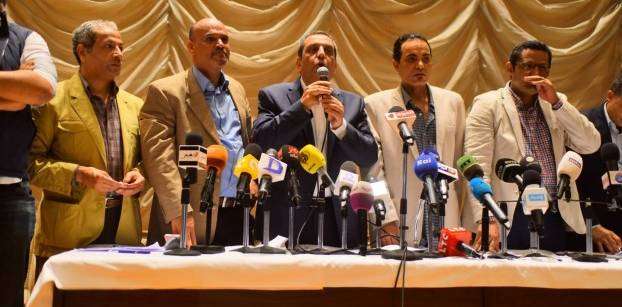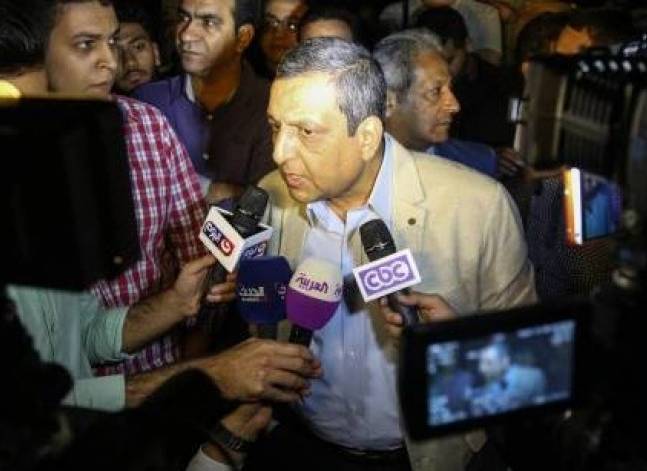Latest NEWS
- Aswat Masriya, the last word
- Roundup of Egypt's press headlines on March 15, 2017
- Roundup of Egypt's press headlines on March 14, 2017
- Former Egyptian President Hosni Mubarak to be released: lawyer
- Roundup of Egypt's press headlines on March 13, 2017
- Egypt's capital set to grow by half a million in 2017
- Egypt's wheat reserves to double with start of harvest -supply min
- Roundup of Egypt's press headlines on March 12, 2017
Press syndicate leaders' trial postponed for further witness accounts
Cairo, Jul 2 (Aswat Masriya) - The Qasr el-Nile court decided on Saturday to postpone the trial of the head of the Press Syndicate, Yehia Qallash and senior board members Khaled al-Balshy and Gamal Abd al-Reheem to July 9.
This Saturday, the court listened to some of the witnesses, but has postponed the trial once again so as to listen to even further testimonies denying the charges against the three men.
Last week, the court had also decided to postpone the trial so as to listen to more than six witnesses in the case, including syndicate member Hatem Zakaria and an officer in the interior ministry.
The three leading syndicate members are accused of "harbouring fugitives", in reference to the two journalists arrested from inside the syndicate on May 1, and spreading false news.
In today’s trial, Qallash's defence team asked the court to hand the evidence to a technical committee for examination, and asked that the two imprisoned journalists, Amru Badr and Mahmoud al-Saqqa, be allowed to stand as witnesses in the case.
The prosecution told the defence team that they have the right to claim that the evidence used is fraud.
On May 1, security forces raided the syndicate’s building to arrest two journalists accused of “inciting protests” against President Abdel Fattah al-Sisi’s decision to hand over control over two strategic Red Sea islands to Saudi Arabia.
The two journalists, Badr and Saqqa, had been at the syndicate’s headquarters when police arrested them. They both work for the Yanayir Gate news website.
On its part, the interior ministry denied in a statement that security forces had stormed the building or used any kind of force.
Qallash, Balshy and Abd al-Reheem had first refused to pay the bail conditioned for their release, which amounted to EGP 10,000. However, co-founder of the Popular Current Party Tarek Nageeda paid the bail on their behalf.
The front to defend journalists and freedoms announced it was holding a meeting on Wednesday to discuss the current situation of the Press Syndicate in light of what they referred to as the "policy of punishment adopted by the regime against the Egyptian press."
An emergency general assembly meeting at the Press Syndicate is also being planned.
Former Judge Refaat al-Saeed said that the "harbouring fugitives" charge against the three Syndicate leaders could lead them to face a prison sentence of up to three years or to pay a fine, as stipulated by Egypt's penal code.
Spreading false news, on the other hand, could only lead to a fine of EGP 5,000-EGP 20,000, as the penal code has excluded journalists from imprisonment on this charge.
"The elements of the crime of harbouring fugitives is missing in the case as the journalists in question have not been convicted by a court as yet," al-Saeed said.
Lawyer Amir Salem told Aswat Masriya that the prosecution's decision to impose a bail on Qallash, Balshy and Abd al-Reheem is a "blow to the law of criminal procedures and the constitution", adding that the goal was to intimidate media workers and subject them to "iron fist" policies.
Activist and lawyer Negad al-Borai said that the judicial authorities sought to subject the syndicate to investigation instead of investigating the syndicate's complaints, adding that the situation is "shocking".
The House of Representatives had requested from its media and culture committee to prepare a comprehensive report about the conflict and to hold meetings with the two parties, however the attempts were unsuccessful in calming the rising tension between the syndicate and the interior ministry.
Amnesty International called the arrest of the Egyptian Press Syndicate's head and two board members "an alarming setback for freedom of expression" and described the storming of the syndicate as "the most brazen attack on the media the country witnessed in decades."













